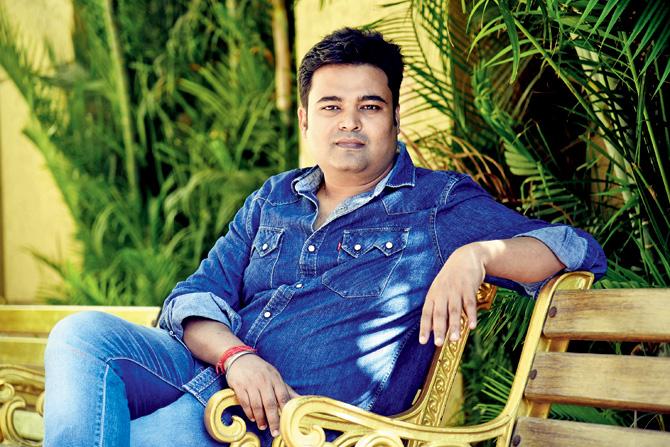Qarib Qarib Singlle lyricist Raj Shekhar discusses using "rejected" poems for his live act, Majnu Ka Tila, and why the audience is lapping them up


Raj Shekhar
In 2013, lyricist Raj Shekhar had penned a song for critically-acclaimed director Devashish Makhija's debut film, Oonga which traces the predicament of adivasis being victimised under the pretext of development. The story plays out from the perspective of a little boy in Odisha. "I had written the song keeping the child and the subject in mind, but to my dismay it never saw the light of day. And, at the time, I thought to myself, what do I with this song?" he recalls.
Little did he know that four years down the line, Haiya Huiya which he had penned in the local Kuvi language, would elicit a thunderous response from listeners at Majnu Ka Tila, an at a intimate and informal gig, that he performed for the first time at a lit fest in Bengaluru in 2016. At these gatherings, Shekhar recites "unused" poetry and songs that were either edited out of a film or were never approved. In this, he is accompanied by Swaroop Bhatra, a guitarist with Pune based band Nu-Edge.
A song of hope
When we speak to Shekhar, who has been living in Versova for the last couple of years, he's in the midst of prepping for his next gig at Pune's Film and Television Institute of India (FTII). He has a few kavitas (poems) ready for the act. One of them is a relatively new song, Jaane de, sung by Atif Aslam, for the Irrfan Khan-starrer Qarib Qarib Singlle. "I'd written a longish poem and due to time constraints, they couldn't accommodate it in the song. I'll be reciting a stanza from there," he tells us. The song is about a love that could have been. "Sometimes, when you look back, you feel it'd have been better if you'd never met that person. It's about that perpetual conflict between holding on or letting go," says Shekhar. Back in college in Delhi, the 37-year-old says, he often played love guru for batch mates who would approach him to write love letters to gift their partners. "A lot of poems are about love and heartbreak - some from my observations, others from experience. It resonates with people," he says. Some that he recites have been culled from this collection.
Despite the melancholy, most of his poems have an underlying message of hope. It also stems from the title, Majnu Ka Tila, also called Delhi's Little Tibet. As a student of Delhi University, Shekhar reminisces spending many an evening there with friends tucking in momos and soaking in the Dharamsala-like vibe. "Every time I'd walk the meandering lanes, I would see a lady drying warm clothes even in harsh summers. I would wonder why. That's when somebody told me that she believes Tibet will be free one day and that they'll be able to return. She dries the clothes in anticipation," he says. That the silver lining is present even in the darkest of clouds inspired Shekhar to launch these gigs while roughing it out in Mumbai's cut-throat film industry after migrating from Bihar. Many of his films never saw the light of day but the big break came in 2011 with Tanu Weds Manu. Songs like Ghaani baavri and Rangrez catapulted him to fame. "Till then, I'd keep writing because I did not want to lose touch with my art," he says.
What's the backstory?
Last year, he performed at Mumbai's Barking Deer Brewpub in Lower Parel. The session, which was sponsored by a corporate, saw a sizeable turnout. Here, he recited one of his oft-requested pieces Arab Sagar Ke Aas Paas which looks at the subject of migration and his own journey from Madhepur, a hamlet in Bihar to Mumbai. "I come from a family of farmers. So, a part of me still belongs there. But, having lived in Mumbai for close to a decade, I've learnt to straddle both. Poetry is my way of coping with the differences," says the 37-year-old, who has previously worked as a writer for a news channel.
Despite the format where Shekhar recites his creations, the sessions are never a one-way street as most people are curious to know the story behind each poem. "They want to know why I wrote it, under what circumstances and more importantly, who I wrote it for," he laughs. Therefore, he makes it a point to pepper it with anecdotes and personal stories. Due to this, the hour-long acts tend to stretch beyond the stipulated time period. That calls for improvisation which requires both him and Swaroop to be on the same page. "When I conceptualised Majnu Ka Tila, I realised that music would uplift the session. So, I wanted somebody from the indie music scene who could connect to my lyrics and lend it gravitas," he says. He met Swaroop, through a common friend two years ago and the two have been jamming together since.
Shekhar admits that despite performing in different cities, he hasn't found a formula to the shows. He gauges the mood of the audience and accordingly selects the poems through instinct. "Sometimes, I think I might just have to tone the lyrics down so that the nuances are not lost on them. But the audience is smart, so I rarely have to."
Catch up on all the latest Mumbai news, crime news, current affairs, and also a complete guide on Mumbai from food to things to do and events across the city here. Also download the new mid-day Android and iOS apps to get latest updates
 Subscribe today by clicking the link and stay updated with the latest news!" Click here!
Subscribe today by clicking the link and stay updated with the latest news!" Click here!





